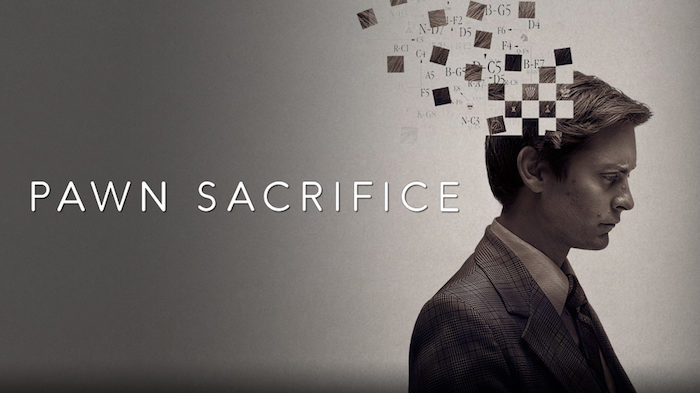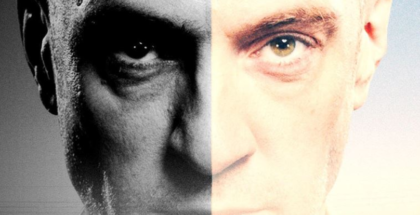VOD film review: Pawn Sacrifice

Review Overview
Cast
7Script
5Final chess match
7Rating
David Farnor | On 13, Aug 2017
Director: Edward Zwick
Cast: Tobey Maguire, Liev Schreiber, Peter Sarsgaard
Certificate: 12
Watch Pawn Sacrifice online in the UK: Apple TV (iTunes) / Prime Video (Buy/Rent) / TalkTalk TV / Rakuten TV / Google Play
“I think he’s afraid of what’s gonna happen if he loses,” says Paul (Michael Stuhlbarg) in Pawn Sacrifice. “No, he’s afraid of what’s gonna happen if he wins,” comes the reply from Father Bill Lombardy (Peer Sarsgarrd). They’re talking about Bobby Fischer (Tobey Maguire), chess prodigy and – thanks to the Cold War – an American hero. Edward Zwick’s biopic attempts to capture the erratic nature of the legend for a modern audience, but in doing so, sometimes takes a few too many steps away from the board.
The movie begins with a familiar montage of a boy genius coming-of-age, introducing us to his caring but irresponsible mum, his bespectacled and bearded tutor (Conrad Pla) and his obsession with chess. That, in many ways, is the problem with Pawn Sacrifice: it tries hard to make things as conventional as possible, with a formulaic familiarity that ironically undermines the logical strength of its central subject. It’s a chess movie, but you’ll wish there were more chess in it.
We do see chess – and lots of it – but it’s often in passing, as Zwick, DoP Bradford Young and Editor Steven Rosenblum seem scared of showing the sport for substantial periods without cutting elsewhere. A tense finale gives us more of a feel for the way Fischer played, but there’s not enough detail about why his choice of moves could be so revolutionary; for a film that trusts its audience will already understand how the game is played, it still takes the safe cinematic road. Throughout Fischer’s career – after an earlier departure, following a tantrum (one of many) – he’s accompanied by those two figures: Stulhbarg’s lawyer and agent, and Sarsgaard’s coach and number two, who also happens to be a priest. Why are they there? How did Father Bill get time off from his parish duties to travel the world and play chess? The answer mostly lies in exposition, as Steven Knight’s screenplay uses them as the chorus to debate Fischer’s inner and outer pressures.
Fortunately, the duo are superb, and well experienced in fleshing out supporting characters, to the point where they make up for the script’s occasional shortcomings. Both, crucially, never steal the show from Tobey Maguire, who doesn’t shy away from the chance to remind us that he is an accomplished performer. When he’s on his own, trashing a living room, he verges on over-the-top, but it’s fitting that in the context of a chess match, or when awkwardly struggling against the confines of scenes out of his control, that Fischer makes a lot more sense. Liev Schreiber has the tougher job of making his opponent, Boris Spassky, interesting to watch, despite barely speaking and mostly being relegated to the background. His calm, imposing presence, though, grounds Maguire’s flashier Fischer; when they square off in the final 30 minutes, Pawn Sacrifice is an absorbing watch.
If Schreiber’s performance recalls his intimidating antagonist in Goon, that’s an indicator of where Pawn Sacrifice is leaning towards: framing their rivalry within the American-Russian feud, the Cold War-tinged tension is where Zwick seems most comfortable, fusing Fischer’s declining mental health with the international scale of the 1972 World Championship. Is Bobby’s breakdown a result of being in such a spotlight, with the CIA and KGB whispering in the shadows? Or is it merely accelerated by his habit of listening to damaging anti-Communist, anti-Semitic (Bobby, bizarrely, was Jewish himself) conspiracy theorists?
In the first half, Bobby talks about the importance of distracting the Russians to be able to beat them, but it’s a possible angle for the narrative that’s left undeveloped in the corner of the board. The title, Pawn Sacrifice, suggests a movie that might give you such insight or delve into the complexities of chess. But the pawn, in this case, is Bobby himself, as he’s backed by the US government to present an inspiring, patriotic soldier against the Soviet Union. Zwick’s biopic naturally draws comparisons with the excellent 2011 documentary, Bobby Fischer Against the World, but it’s a closer companion piece to ice hockey documentary Red Army, which explores the relationship between politics and popular sport. Both are superior pieces of cinema, but if you can step away from the board with it, Pawn Sacrifice is a compelling character study of an intellect beaten perhaps not by chess, but by the celebrity circus of national pride. Mate? Not quite, but there’s enough here to hold your attention in check for a couple of hours.


















